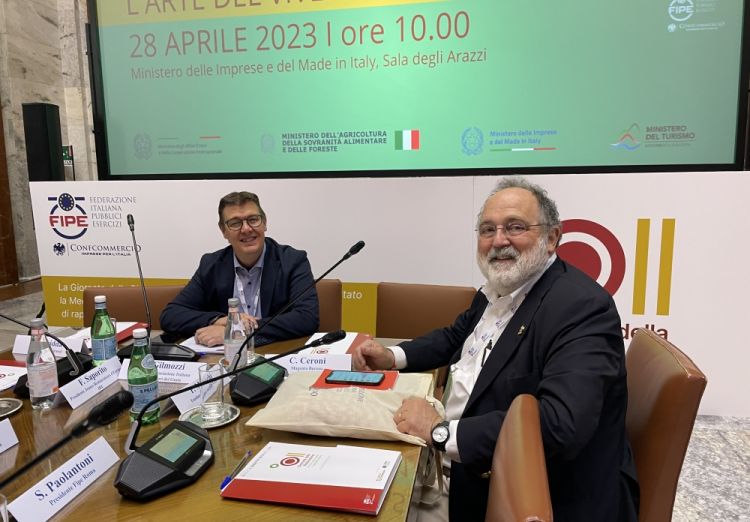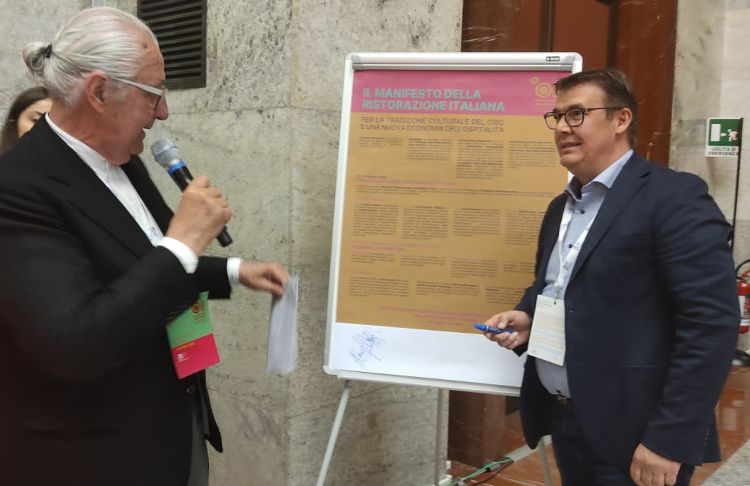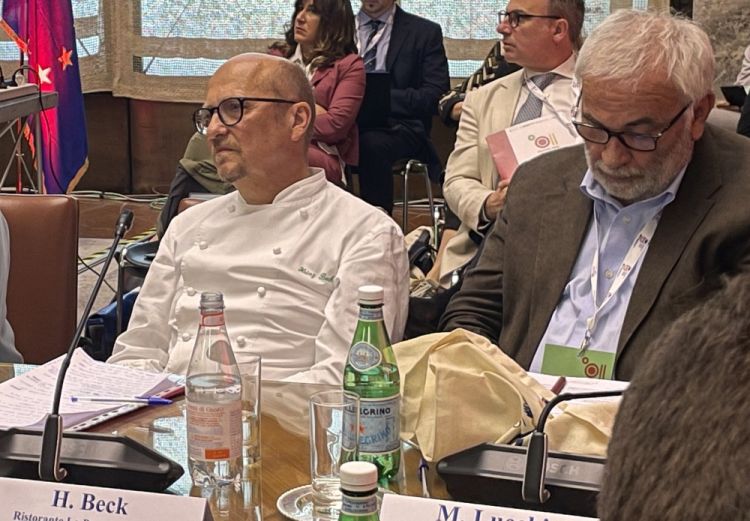A first time of great importance: social, cultural, and even political. The 28th of April 2023 will be remembered by many as the first Catering Day for the Culture of Italian Hospitality, the initiative conceived by FIPE-Confcommercio, with the patronage of the Ministry of Business and Made in Italy, the Ministry of Foreign Affairs and International Cooperation, the Ministry of Agriculture, Food Sovereignty and Forestry and the Ministry of Tourism.
In addition, this event was awarded with the Medal of the President of the Republic for its social and cultural value. Through activities spread throughout the country, more than 5,000 public businesses, including restaurants, trattorie, osterie and pizzerias, were involved. And 500 Italian restaurants abroad took part too.
But what are the objectives of
Catering Day?
Lino Enrico Stoppani, President of
FIPE-Confcommercio, explained them at the kick-off event, held in Rome at the Ministry of Business and Made in Italy: 'This Day was created with a dual value, one of remembrance and one of valorisation. On the one hand, it’s an invitation to remember, to recall the sector’s crucial role in the country’s economy, social and cultural life and values. A sector that was considered 'non-essential' during the pandemic crisis, and for this reason suffered huge losses, but has in fact an essential relevance for Italy. That is why, looking to the future, the second point, the most important one, is the valorisation of this sector. We hope this day can be a moment of reflection and pride for a sector that has seen its resilience severely tested in recent years. On the other hand, together with the institutions and the entire sector, we want this to be a recurring occasion to think and rethink new, more sustainable models. There are so many things that need to be done. This day will not make things straight, but it’s a very important opportunity to set our sights straight and move forward united towards the many goals that we have set ourselves.’
‘Celebrating the Catering Day at the Ministry of Enterprise and Made in Italy means valorising the work of an entire supply chain not only in terms of products, but also of the culture, style, and history that make our country unique,’ said the host, Minister of Enterprise and Made in Italy Adolfo Urso. ‘Italian creativity is the engine of our economic strength and catering, as a supply chain of values, is one of the pillars of Made in Italy. I hope that this Ministry will be able to welcome the ceremony for the recognition of Italian cuisine as a UNESCO heritage site.’
Francesco Lollobrigida, Minister of Agriculture, Food Sovereignty and Forestry, also joined the first
Catering Day, connecting live from London: ‘In Italy we have quality, which, if enhanced, can lead to an exponential growth of our exports,’ he said, ‘and the campaign for the recognition of Italian cuisine as a Unesco heritage site is a battle to enhance our culture, our civilisation, but also to support our economy.’
Finally, the Minister of Tourism Daniela Santanchè also sent her video-message endorsing the initiative: ‘I wish the industry represented by FIPE all the best, because restaurants and restaurateurs are the ambassadors of Made in Italy in the world. I’d like to thank them for their great work.’

Paolo Marchi, right, with chef Alessandro Gilmozzi, President of the Italian Association of Ambassadors of Taste
Over the course of the morning, there were many voices discussing the topics set by
FIPE for the first Catering Day, including that of the creator of
Identità Golose Paolo Marchi, who concluded the proceedings with his speech: ‘
Lino Stoppani,’ said
Marchi, ‘remembers very well that twenty years ago we were already meeting to build what is finally happening today, with this first Catering Day. Knowing the all-Italian ability to divide and devote ourselves to bad-mouthing each other, it is a very important achievement to have managed to get us all together, united for a single goal. But we must be aware that we should have started much earlier: a profound cultural revolution is needed in this sector, we must succeed in attacking labour costs, we must tackle the flight of many professionals from the restaurant industry, we must significantly improve training to prevent young people from thinking they need to go abroad. There is a lot to be done and we can only achieve these goals by abandoning jealousies and hostilities, and making sure that many more will be born from this Day in the coming years.’
For the realisation of Catering Day,
FIPE asked the collaboration of
MAGENTAbureau, with the creation of the national central secretariat that provided the necessary tools and indications so that the associations themselves could solicit the participation of the highest number of restaurants and restaurateurs.
Claudio Ceroni, president of
MAGENTAbureau and founder with
Paolo Marchi of
Identità Golose, commented as follows: ‘At
MAGENTAbureau we’re very happy to have accepted the invitation of
FIPE, which approached us to collaborate actively in the realisation of
Catering Day, recognising our organisational experience in this field. We enthusiastically joined an initiative that aims to create a system among all the players in the sector, overcoming divisions and presenting itself as a true cultural operation that puts catering at the centre through the values of sharing and conviviality.’
The support of many associations to this initiative well-represents this unity of intent: Associazione Italiana Ambasciatori del Gusto, Associazione Professionale Cuochi Italiani (APCI), Charming Italian Chef (CHIC), Federazione Italiana Cuochi (FIC), Jeunes Restaurateurs d'Europe (JRE), Slow Food Italia, Unione Ristoranti Buon Ricordo, Fondazione Banco Alimentare Onlus, Euro-Toques Italia, Le Soste, Italia a Tavola and Identità Golose.

Davide Rampello with Alessandro Gilmozzi, at the signing of the Manifesto of Italian Catering
, with
R&P Creative Studio, curated the creative and artistic direction of the first Catering Day. In fact, it was also the occasion for the presentation of a
Manifesto, designed by Rampello himself, which was then symbolically signed by all the participants at the
Ministry of Enterprise and Made in Italy. You can read the Manifesto
by clicking on this link.
'I am very satisfied with the results we have achieved today,' Rampello told Identità Golose, 'both because many association signed the Manifesto, and and because of the concrete interest shown by three ministers of our government. But now it’s up to us: we have the guidelines, we have the political will, now we need concrete actions. We must not wait until next year: the second Catering Day will be a success if in the next 365 days, we are able to implement the intentions declared today.’
While an intense morning of work took place in Rome, there were dozens of widespread initiatives linked to
Catering Day throughout Italy. The 5,000 Italian restaurants that took part were invited to propose a bread-based dish on their menus, the fil rouge of the first event for its strong symbolic value as an element par excellence of sharing and conviviality. This was then linked to an important solidarity initiative: for each dish ordered in the participating restaurants,
FIPE will make a donation to
Caritas Italiana, underlining the importance that the day wants to reserve for the promotion of the values of inclusion, sharing and relationships on which our culture of hospitality is based.
Intesa Sanpaolo will further contribute to the initiative in favour of Caritas Italiana and against food poverty by raising funds on the crowdfunding platform
ForFunding.

Chef Heinz Beck also participated in the initiative at the Ministry
Translated into English by Slawka G. Scarso